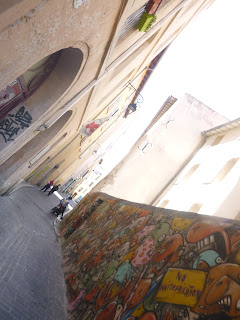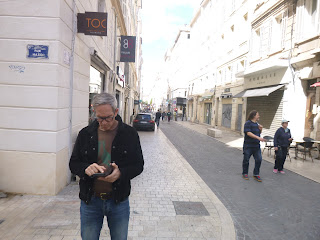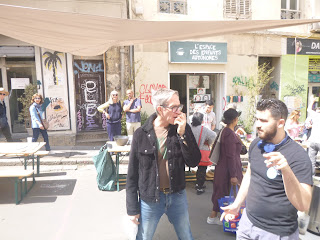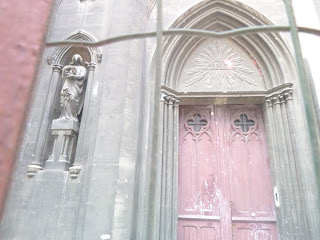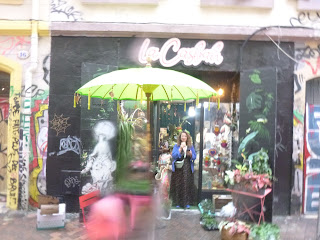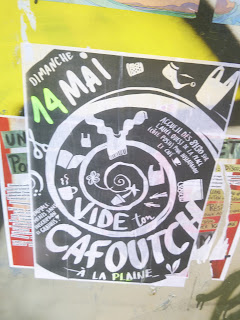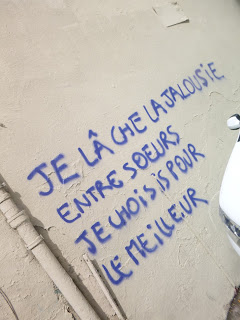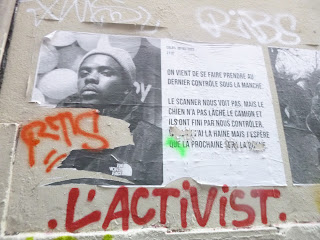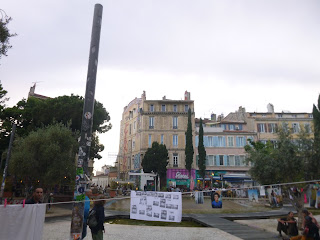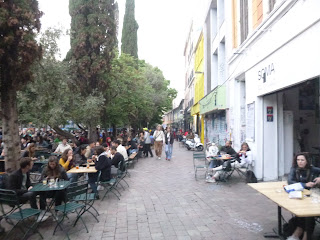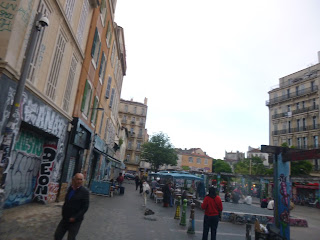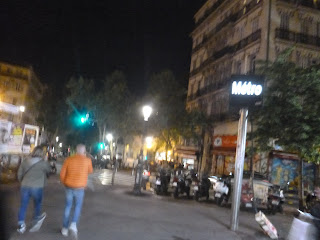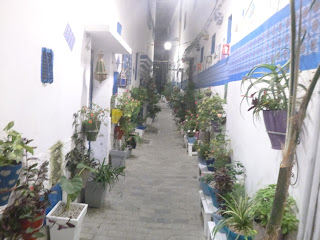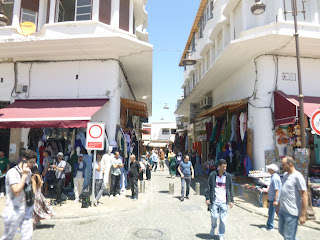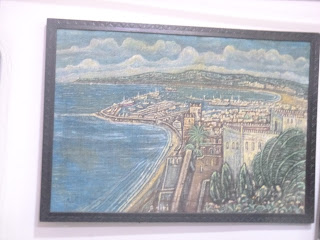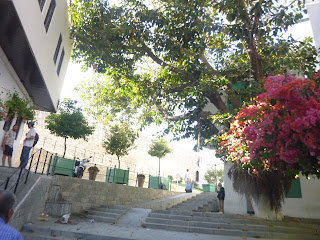“Holy New York Holy San Francisco Holy Peoria & Seattle Holy Paris Holy Tangiers Holy Moscow Holy Istanbul!” Allen Ginsberg, Footnote to Howl.
“The flight time between Marseille (MRS) and Tangier (TNG) is around 2h 10m and covers a distance of around 1281 km,” advertises Ryan Air, for their new route. From Spain, it's only a few kilometers and, yes, you can see each other, each continent from either side. Between ocean and culture, ever flowing history and colonies past, empires present, boats and ports, fisherman and merchants, bread and dreams, the space between is vast. Worth traversing, it tells a lot.
When I read the Rolling Stones recorded Exile on Main Street on the French Riviera, I was drawn to the city where Keith procured his elixirs. There was something about those guitar chords and Moroccan spices, the black and white photos of the sessions five decades prior. "A lot of Exile was done how Keith works," recalled Charlie Watts. “...he's very loose. Keith's a very bohemian and eccentric person, he really is." Those chords stuck with me. “The Rolling Stones felt like exiles,” recalled Keith. I wanted my own exile there, I told Jean Francious at Rockaway Beach the summer before I left. “I’ll accompany you,” he said. “It's my favorite city in France,” said Allessandra at Kotti Cafe in Berlin.
Cloudy and foreboding, Berlin inspired countless stories, artists passing through, anarchists hatching plans, between the city and oblivion, a jumping off point for adventures from Paris to Lyon, Marseilles to Tangiers.
Carrying a light bag and a paperback for the journey, I made my way to the airport before the sun rose, past Alexanderplatz to Brandenburg. Reading about art and music, imagining the dope Keith smoked, writing “Tumbling Dice,” what Mick was feeling, sitting in France, singing “Sweet Virginia” with his Southern twang. On the travelers made their plans for connections to Nice and Florence. On, I made my way. "The entire city was united in this sensitivity to everything colorful, musical and festive, in this delight in theatrical spectacle as a playful reflection of life, whether on the stage or in real space and time..." wrote Stefan Zweig, my traveling companion in paperback, in his own exile.
The sun popped from the sky when I walked out of the airport, grabbing a bus to my hotel, near the port, where Steve, my old San Francisco buddy with a beer in hand, had already already arrived by way of Lyon, the food capital of france. Smelling the sea air, looking at the water, the sexy people, feeling the buzz in the rough and tumble restaurants and cafes, the Moroccan food, placates of bouillabaisse, in the cafes, on the streets, big skies and a lively waterfront, it's exactly what I imagined.
From the hostel, we walk to get a beer, to the market, to the ports, to the waterfront, on our afternoon exploring the north quarter of Marseilles, reading the writing on the walls.
“Squats for all” screams one of countless tags.
A message grabs our eyes.
Solidarity Noailles:
“Following the tragedy of the Rue d'Aubagne, dozens of families have lost everything overnight:
-their homes
-their personal belongings
-all the landmarks of their daily lives.
These families, already victims of poverty and precariousness, have experienced in their flesh an additional misfortune which was however largely foreseeable. These people, who are, I remind you, our fellow citizens, will take years to rebuild their lives, and not all of them will succeed.
Beyond the legitimate questions that we all ask ourselves regarding responsibilities, we have a duty of immediate solidarity for these families. Many of you are moved and shocked by this tragedy. You can show your solidarity with the victims by a simple gesture.
Monday, Tuesday, Thursday and Friday
- Women from Here and Elsewhere of Marseille
You can amplify the chain of solidarity by spreading the information to your entourage....”
What happened, we asked someone walking by.
Six people died here, she said, gesturing to the vacant lot at 63 and 65 Rue d'Aubagne.
Their house crumpled in on them. Nearby, as kids painted, and others organized, the story of the space.
On we keep walking for couscous and beer in a funky Moroccan restaurant full of rugs, families popping in and out, arriving just in time to miss the rain. We stay there all afternoon.
And keep on walking through the market to the Creative Quarter, where we stumble into a funny dance party outside of an offtrack betting spot. Beer and tunes are flowing, the Quarter of the Creatives open, people out enjoying tapas, streets filled with people, dancing away.
Part of the appeal of Marseilles is it's a rough city, a mixed city, ever impacted by its history with North African, full of color, with its history of civil wars with Algeria, an evolving post colonial relationship; the dynamic is far from even, with crumbling neglected buildings of poorer, neighborhoods full of people with North African roots. Most certainly, both coasts are learning from each other; hopefully the relationship is becoming more even.
These days, you feel that relationship changing, with more and more art dedicated artists from North Africa, who make their way, Arabic colors, African images that influenced surrealist images, Mexican masks, and Algerian stories, a show of Baya, an Algerian artist, orphaned at the age of five, whose work drew the attention of Andre Breton, and friendships with Henri Matisse, their mutual influences, eventually being discovered “by fabled gallerist Aimé Maeght who, along with André Breton, organized an exhibition in Paris in 1947.” Her work was credited with major influences on “surrealist,” “post colonial” and “outsider” art movements. Today, her shows still spaces for understanding, and dialogue: “The Museums of the City of Marseille and the Institute of the Arab World … present the event exhibition "Baya. An Algerian heroine of modern art". This large-scale monographic project is dedicated to the work of the Algerian artist Fatma Haddad (Bordj el Kiffan, 1931 - Blida, 1998) internationally known today under the pseudonym of Baya….Made up of more than a hundred works, the exhibition looks back over the entire artistic trajectory of Baya and allows the public to discover all the facets of the production of this singular figure of 20th century art. in the Mediterranean - between painting, drawing and ceramics…. Carrying a vision of culture as a source of individual emancipation and a tool for opening up to the world and its diversity…”
After the show, we stumble into a marching band, La Farigoule Fanfare, playing on the waterfront. And make our way beyond the Roman ruins to the the Marseilles History Museum exploring the history of this "city of saints," founded by the Greeks in 600 BC, the marriage of Gyptis and Protis, and the legendary history of this city of migrants, the oldest city in France, its tragic past and recent struggles, the roundup of some 2,000 Jews from the ports here in during the Vichy years, known as the Marseille roundup 22 and 24 January 1943. The last room in the museum was dedicated to the reverberations from from recent events in Noailles:
“The "Rue du Musée / Musée de la rue" project was born from the trauma linked to the collapse of buildings 63 and 65 on rue d'Aubagne and the humanitarian crisis caused by the numerous danger orders suffered by the population of the district. de Noailles and elsewhere in the city, after November 5, 2018. The collapse of the buildings in the rue d'Aubagne constituted a major upheaval and a brutal historical and biographical break in collective history and thousands of individual stories. [It] marks the start of a participatory collection of objects, stories and works inhabitants, neighbors, displaced persons, children, collectives, associations which will enter the heritage and citizen fund set up by Noailles Debout. This fund will be enhanced and maintained in partnership with the Marseille History Museum so that history remembers history so that it does not repeat itself. Were you touched, mobilized, concerned by the collapse of 63-65 rue d'Aubagne? Do you have documents, traces, memories and personal, family and/or neighborhood archives? Do you know people whose story deserves to be shared? Have you been dislodged and would like to testify about your experience? Did you take part in the momentum of solidarity or in the struggles linked to the drama of November 5 and the dislodgings? Come and drop off, come and share your objects, your memories…your texts, your dreams and even your anxieties…” I guess we’ve all felt dislodged at some point. Onward, through the hot sun in Marseilles, and its struggles, Phonoicians, Carthage, crusades, eternal conflicts, and possibly reconciliation. Everyone said ‘don't go to Marseilles,’ ‘it's dirty.’ From the Baya paintings to waterfront and couscous, each reminds us we can learn from each other. There are stories, redemptive stories, different chords, mixing bodies, colors blurring changes cities and consciousness.
Eventually Steve left, departing for Lyon. And it all started to blur. The New York Times seemed to be fine with recent developments in Tangiers: “Tangier is building a huge new port, a green seafront and Africa’s first high-speed train line. Monuments and museums are getting face-lifts, and the streets of both the centuries-old Moorish medina and the colonial-era neighborhoods are sprouting boutique hotels, design shops and Euro-Moroccan restaurants.”
An ominous sense of disappearing accompanied me, as I made my way South. The magic light, shining on all our faces, became darker, giving way to the sense that I was walking in Daniel Pearl’s footsteps, before he was abducted nearly two decades ago. My disappearances, between cities remind me. A similar feeling grasps, like Paul Bowles novels, stories of people getting as far away from everything they knew as they can, those who lost a bit of themselves once here, or on the way, Burroughs' wife gone. The man to my left reads Circe, as I read Sveig thinking of the Universitat Vitus, the lessons of the university of the street, ever luring us forward. Across the ocean, to the land without laws, where the free spirits came for a bit of what they could not get at home, chasing a feeling that had eluded them, trying to understand our misunderstandings, our lostness. Our mutual resentment, our civil wars unreconciled, our terrors, fears of dark others in our dreams, Algerians resistance movements, an amiable waiter in Madrid who said I should go, definitely go, go, as sat drinking vino tinto and soda on a hot afternoon after a trip to the Prado. “It's safe and wonderful. Go.” 53 years into this life, finally going, where Jack and Allen and Paul went without a hint of doubt. It takes me two thirds of a lifetime to get here. The sun's screaming through the sky, magic light shines through the sky as we make our way, descending on Tangiers, once french, Spanish, Roman, of wars and wonder, a city beyond borders and history. I find myself in a cab to Kasba Blanka, my hotel room. Through the new city. Part of me wishes I hadn't come. Cab drops me off. On the edge of the kasbah, white buildings everywhere, like Pépé le Moko, just winding streets that seem impossible for an outsider to navigate. No hotel in site. A young woman asks me if I need help. I have no other choice. Winding me through twisty streets past a tree to a fountain, she walks me, showing me to my hotel. Small tip. Prayer fills the air. Inside, full of rugs, they welcome me, bringing me a pot of sweet tea. Back out to the street, I walk. My friend is still there, shows me through the town, tells me about Kasba Blanka, where she’s grown up. Takes me to a cafe serving tea, a restaurant serving couscous, called Vanduluccia, through winding streets past kids celebrating a soccer match, to a man selling art, to the water, to a young boy trying to get me a cab, past a cat in the alley, to a view of the ocean, across the sea, moon above, hash in the air. Do you want some? No thank you. I buy an ice cream and walk back to the hotel. She smiles and we depart. Thoughts descending into sleep, dreams, Savitri tells me something, offering a clue. We correspond.
Birds greet me in the crisp morning. Tea on the roof, looking at the water, feeling the sea air, looking at Spain, wondering, greeting. Tours scheduled for morning and afternoon. Hey Mr ice cream says the man I bought ice cream from the night before. The woman who walked me about the night before greets me with her son, says, “Hi, He's a good guy,” to our driver Billal, who picks up, shows me the synagogue by the market. “All three religions get along fine here,” he tells me. “No problem. The world needs to learn a little of that. We were the first country in the world to recognize the US. You didn't know that.” What about clash, I ask. The main cleavage is rich and poor, he tells me. Independent since 1956, they didn't have the same fight as the Algerians, who lost over a million people in their war for independence, that ended six years later. There is Spain, he tells me I can get a 15 minute ferry to from here. We get along well with France despite our history. It's the past. Don't listen to the French with foreign policy I say lamenting our support for them in VietNam. What a mess. That was the beginning of the end for us. We drive to the train station to pick up the others on our tour of the Spartel Cape and the Hercules caves, the strait of Gibraltar and Kasbah district to the port, of the old Medina. Up Mohammad Drive, past Cafe de Paris and the markets, through California. Looks like Palo Alto, I say. Its called California, says Billal. Six hours to the desert from here. Looking at the Atlantic Ocean to the left, and the Mediterranean to the right, I wonder which way to go. A walking path below calls. To the Grotto of Hercules, in Cape Spartel, we walk into the caves, full of musicians jamming, telling stories inside the grotto. Beatrice tells me the French love the Moroccans. But not the Algerians. “We have a big problem,” she tells me. Why I wonder. “The French love us. We learn their language, but they don’t learn ours,” said the Abdul at our hotel earlier in the day, reflecting on the historic imbalance. Back to the Medina and the Kasbah, walking through the market. Arab Spring didn't really have an impact here, says Billal. It was more in Casablanca. Off to Cafe Hafa, Asri walks us. Allen G was here, back in those days, when it was an international zone from 1912 to 1956. Mohamed Choukri was writing Le Pain Nu, his roman à clef about prostitution, poverty, and the underworld, only to be largely banned, before it became a sensation. “This is life in the time of mistakes,” he wrote. “I had been polluted by the night of the streets. Even the decent crazies on the streets have disappeared.” I guess everyone had been. After all, he confesses. “We shouldn't put too much trust in happiness. It comes and goes. And when we try and take hold of it, it slips away from us. It's like a beautiful bird sitting on our balcony rail and flying off the moment we get too close.” We sit drinking delicious tea with mint leaves, watching boats to Tarifa, in the distance. “Tangiers was a strategic place,” says Asri, full of businessmen, diplomats, telling us about the golden age from the 15th to 17th centuries, built by Portuguese to protect the Medina. Colonialism followed. 1956 elections signaled with a peaceful transition. Marrakech is French now. Morocco appreciated the French here, with schools and restaurants, writers here, Bowles, Tennessee Williams, Matisse, Delacroix, says Asri. He works in the harbor, in the ports, hustling up tours. And lives in Asilah, on the tip of the Atlantic coast, some 31 km south of Tangier. It's the capital of street art, says Asri. “Today, there's a religion problem here,” tells us. “People still miss the French. But you can't get them back.” It's like Brexit, say the Brits. Finishing our tea, we walk through the Casbah, through ever twisting streets and vendors, full of wonderful paintings, movie posters, old passports, books, rugs, food of all kinds. A man screams by a mosque. “We’re still stuck like stereo, in the past,” says Asri. “Still an old mindset. That's the problem in the Muslim world, people still thinking on the ninth century.... People still living in the old way 14th century,” he tells us. Using communal baths, ovens etc. “Salaam lebes. Hello how are you,”,” says Beatrice. Asri takes me back to the hotel to regroup. And greets my friend from the night before. “He’s a good guy,” she says. “I am taking care of him,” she says to Asri. “You do too.” He gives her the tip i gave him. “You tip me, I tip her, and she tips someone else. She has kids,” says Asri, as we drive to Cafe de Paris. “I have kids. I know how hard it is to get milk for your kids... This is how we keep the world moving forward. We started out as strangers, now we are friends,” says Asri, saying goodbye. I sit in Cafe de Paris, thinking about cities and people, watching the city. Two men, talk between tables, chatting about the time in between.. el tiempo entre costuras. Merci bien, they say to me, as I bid everyone adieu. And I walk back, trying to find my way, like all the gringos, lost in the kasbah, old ideas and new, old ghosts, trying to remember the way, old fears, thinking of Pépé le Moko and the old movies, back and forth through the kasbah, past book vendors and mosques and the Hamman, lost again. Two boys accompany. I can’t pay you, I say. Its ok, we love the USA, they say, walking me, swerving from street to street, finally to their uncle’s rug store. I gotta go, I say. I am back at the front of the Kasba. Better walk around it. It could take years to learn your way. Still I finding my way to Kasba Blanca, where Abdoul is waiting for me. He brings a cup of tea and we catch up. He tells me about his work and the city. Other hotel guests arrive, needing their own cups of tea. He regales each one with stories. “Welcome to the city where you can swim in both the Mediterranean and the Atlantic,” says Abdoul, welcoming new guests, bringing them tea. “Welcome to Tangeriers and the time time of mystics, home of Mohammed Coukri, Between two oceans...woman with two faces. This is a special city, the home of the famous traveler Ebn Batouta.” On the afternoon winds down, everyone chatting about reading, writers and cities, travelers sharing notes. Sometimes the road becomes your friend , teaching us to reconcile with conflicts, feeling a connection with others, with my parents who traveled here, and the Italians here, and Rick and company looking for ways to live and love in complicated times, with or without love on the move, alone on the train.
Abdul tells me my cab is here and we say goodbye.
Please come again and stay in touch, he tells me.
And I make my way to the airport, for my journey over the ocean to Spain, starting to read and daydream. In “Tangier, the Big Mountain, and Paul Bowles," Mohamed Jouay says. “Tangier is the cosmopolitan city par excellence. It served as the International Zone for many decades while the rest of Morocco was prey to the scramble of France and Spain. The city, overlooking both the Atlantic and the Mediterranean, is also a geographical, historical, and cultural link between the New and Old Worlds, the Orient and the Occident, Europe and Africa. Thus living in this “Interzone”... is equivalent to living in the interregnum of a cultural frontier, permanently suspended between clashing winds and opposed loyalties. In this binary opposition of time and space....Within the same space of this Janus-faced city there are other bigger mountains between the City of Dreams and the City of For Bread Alone. The stark disparities between these two faces might lead one to speak of some kind of “urban apartheid”.... The big divide, says Jouay, "is not only economic or historical, but also cultural. And the cultural divide is certainly the worst of all imperial hegemonies because it lingers on in the attitudes and psyche … even when the conditions of colonialism are removed or no longer visible...either civilized or barbarian, superior or inferior, rational or anarchic, and so on...the gulf between races and cultures can be narrowed or partially eliminated. But the fact remains that the generation of expatriates who are most often associated with Tangier has sought refuge in this particular place because they took it for the promised land where they could shed their sicknesses..."
Maybe, we all can. It's the city of Coukri, Burroughs and Genet... The violence and the promise, the hash and the stories, conversations with ourselves, learning from the other. Still the gap between the city of dreams and or bread alone, it only expands. Thinking about Baya and adventures and oceans and stories and writers and readers and travelers and explorers from this world to the other, and the spaces in between. Half asleep, we arrive in Barcelona, where the bars are open and I can finally get a beer. Everyone’s up, I toast to all I’ve seen and the kind people who accompanied me, showing me their city. A strange feeling of connection with everything is surrounding me, waiting, in motion, waiting, perpetual, ebbing in between, dosing in and out of sleep with everyone else on our six hour layover, before returning Marseilles, and making my way East to Georgia. Sometimes the world surprises me.











































































































